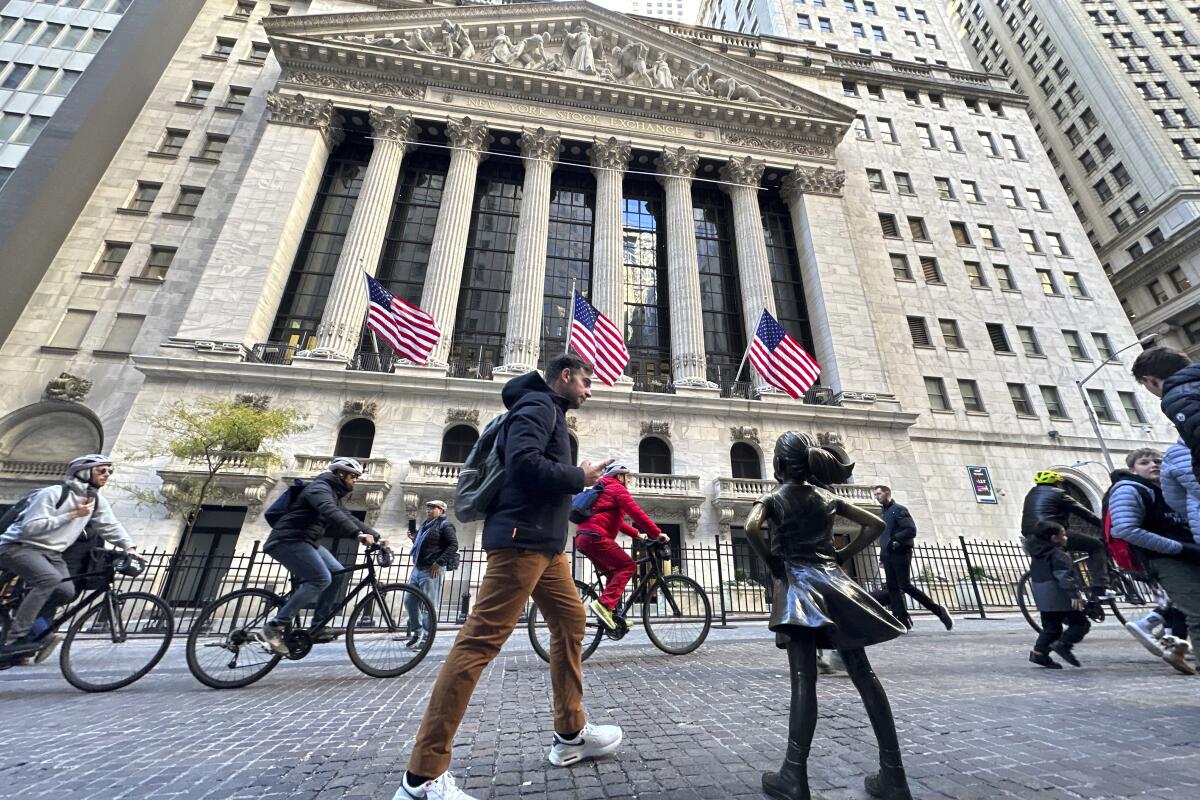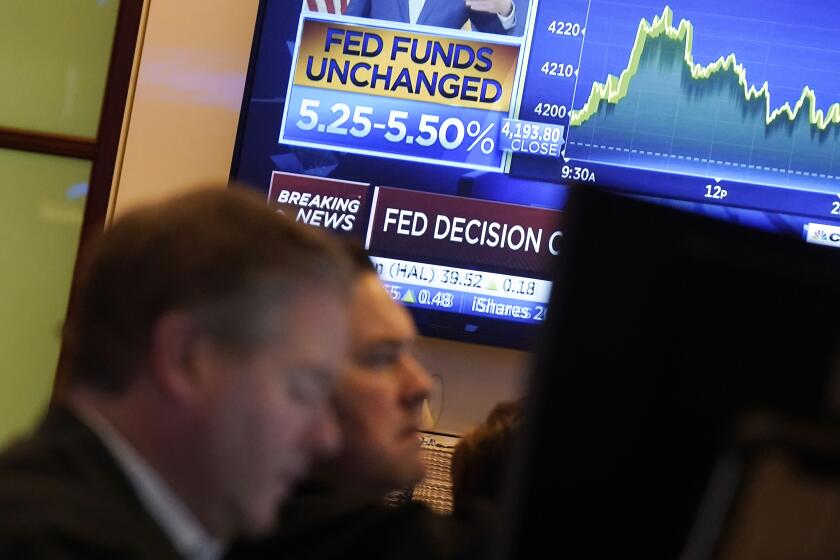Wall Street wobbles to a mixed close, and yields yo-yo after an inflation report

- Share via
Wall Street wobbled Thursday after an update on inflation raised questions about when the Federal Reserve could begin the interest rate cuts that investors crave so much.
The Standard & Poor’s 500 slipped 3.21 points, or 0.1%, to 4,780.24 after swinging up and down a few times through the day. The Dow Jones industrial average rose 15.29 points, or less than 0.1%, to 37,711.02, and the Nasdaq composite edged up by 0.54 of a point, or less than 0.1%, to 14,970.19.
Stocks had been roaring toward record heights on expectations that a cool-down in inflation would get the Federal Reserve to cut interest rates sharply, which can boost prices for investments. Thursday morning’s inflation report was seen as a test of whether Wall Street’s hopes had gone overboard.
It showed U.S. consumers paid prices that were 3.4% higher overall in December than a year earlier. That’s an acceleration from November’s 3.1% inflation rate and a touch warmer than economists expected.
But trends underneath the surface may have been more encouraging. After stripping out food and fuel prices, which can shift sharply from month to month, the rise in prices from November into December was close to economists’ expectations.
Higher energy and housing prices boosted overall U.S. inflation in December, a sign that the Federal Reserve’s drive to slow inflation to its 2% target will likely remain a bumpy one.
Altogether the data will probably cause traders to push back forecasts for the timing of the first rate cut, several analysts said, but they don’t preclude the central hopes that have sent stocks near records: Inflation is cooling, albeit in a jagged way, and the economy looks likely to avoid a bad recession.
“Today’s inflation report reinforces the notion that the market had gotten a little overexcited around the timing of rate cuts,” said Seema Shah, chief global strategist at Principal Asset Management. “These are not bad numbers, but they do show that disinflation progress is still slow and unlikely to be a straight line down to 2%.”
The inflation data sent Treasury yields on a jagged run in the bond market. After sinking from Wednesday night into Thursday, they jumped immediately after the report’s release as traders trimmed bets for the first rate cuts to arrive as soon as March.
But yields quickly began yo-yoing afterward. By late afternoon, they were lower again and helping stock indexes to recover much of their earlier losses.
The yield on the 10-year Treasury slipped to 3.97% from 4.04% late Wednesday. It’s down from more than 5% in October.
Economists at Bank of America said they’re sticking with their forecast for the Fed to begin cutting rates in March, despite the warmer-than-expected inflation data. Some of the drivers of the recent strength, particularly used cars, should fade in coming months, they said in a BofA Global Research report.
A jump in oil prices put some upward pressure on inflation and yields, as they trimmed their sharp losses from earlier in the week. A barrel of benchmark U.S. crude rose 65 cents to $72.02. Brent crude, the international standard, gained 61 cents to $77.41 a barrel.
You thought they were only for carrying a beverage? Thanks to the viral Stanley tumbler, portable drinkware has become an extension of your personal style.
Also in the energy industry, natural-gas producer Chesapeake Energy rose 3.2% after it agreed to sell itself to Southwestern Energy in an all-stock deal valued at $7.4 billion. Southwestern fell 2.5%.
Elsewhere on Wall Street, Citigroup lost 1.8% after it detailed a list of charges it will take against its fourth-quarter results, related to such things as Argentina’s troubled economy and a previously disclosed special assessment by the Federal Deposit Insurance Corp.
Hertz sank 4.3% after it said it expects to record a drop in the fourth quarter for an underlying measure of profits, and it’s selling about 20,000 electric vehicles to cut its EV fleet by a third.
In cryptocurrencies, the price of bitcoin was swinging a day after U.S. regulators allowed for the trading of the first exchange-traded funds that hold the digital currency rather than just futures related to it. The hope in the crypto world is that by making investing in bitcoin easier, the ETFs will draw new types of investors to the field and drive it further into the mainstream.
Coinbase Global, which will keep custody of bitcoins for some of the ETFs, climbed at the start of trading but then gave up the gains. It ended 6.7% lower.
In stock markets abroad, indexes were mixed.
Tokyo’s Nikkei 225 rose 1.8% to its highest finish since February 1990, when Japan’s bubble economy was beginning to deflate. Indexes in Europe, meanwhile, were mostly lower.
AP writers Yuri Kageyama and Matt Ott contributed to this report.
More to Read
Inside the business of entertainment
The Wide Shot brings you news, analysis and insights on everything from streaming wars to production — and what it all means for the future.
You may occasionally receive promotional content from the Los Angeles Times.












